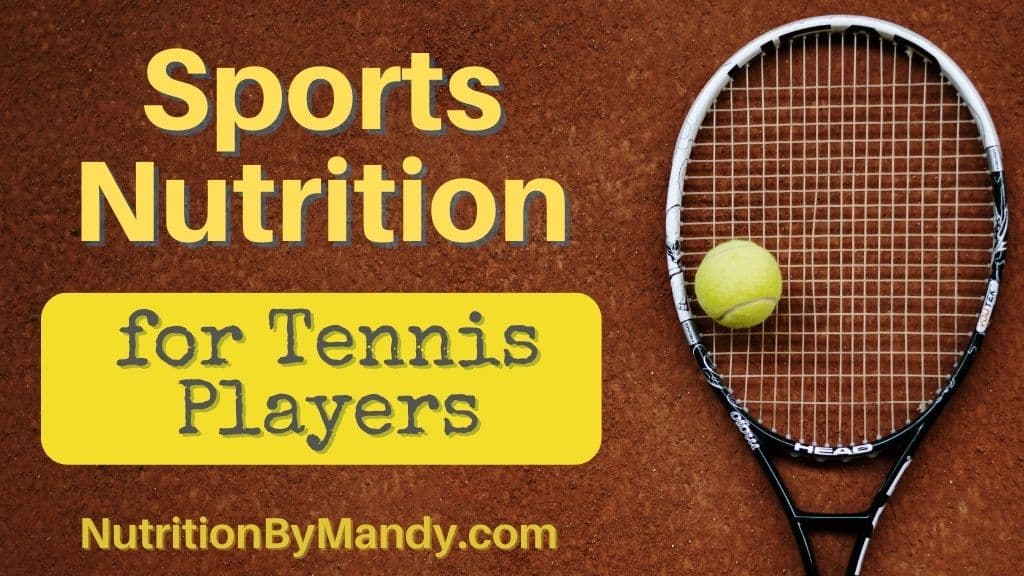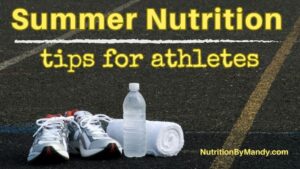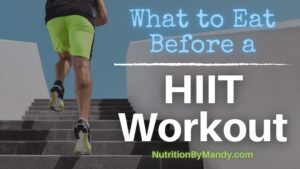Last Updated on September 6, 2024 by Mandy Tyler, M.Ed., RD, CSSD, LD
Sports Nutrition Diet for Tennis Players
It can be helpful for tennis players to know the best diet to follow to support their sports nutrition needs.
Let’s take a look at the energy demands of tennis. We will then explore how to create a sports nutrition diet plan to help tennis players train and perform at their best.
Energy Demands of Tennis
Tennis is a sport that requires both explosive bursts of activity as well as aerobic endurance. Tennis players must have speed, agility, and power to succeed on the court (1).
Tennis matches may last for several hours. Each match may include hundreds of movements and direction changes throughout the course of play (1, 2).
Tennis players must contend with the weather and be prepared to play in hot and humid conditions (1).
Having a sports nutrition plan in place is a key component in supporting optimal performance on the tennis court.

Foundation of a Healthy Sports Nutrition Diet for Tennis Players
Before looking at sport-specific strategies, it is important to discuss how to build a sports nutrition meal plan that supports the health and performance needs of tennis players.
Nutrition for Tennis Players: Ensure Adequate Energy Intake
It is important for tennis players to consume adequate calories throughout the day to support both their health and training needs.
Tennis players often expend a high number of calories through practices and competitions, strength training and conditioning, as well as normal daily activities.
When daily caloric expenditure from these activities exceeds dietary intake of calories from foods and beverages an imbalance occurs. We refer to this imbalance of calories as Relative Energy Deficiency in Sport Sport or REDs (3).
REDs is associated with a syndrome of health concerns that can have negative impacts throughout the body. In addition, the caloric imbalance can also negatively impact sports performance (3).
For these reasons, it is a top priority for tennis player to avoid underfueling and to ensure adequate daily caloric intake through meals and snacks.
Tennis Nutrition: Focus on Key Nutrients
In addition to adequate caloric intake, there are several key nutrients tennis players should focus on including in their sports nutrition meal plans.
Carbohydrates for Energy on the Tennis Court
Carbohydrates provide the body with the energy needed to perform at its best. Athletes can get carbohydrates in the diet from a variety of sources, including:
- Grains: Pasta, rice, bread, bagels, cereal, oatmeal
- Fruit: Fresh, frozen, dried, canned in natural juices, applesauce
- Starchy vegetables
- Dairy: Milk and yogurt
Similar to gas for a car, carbohydrates provide the fuel for the body to run on. Therefore, consuming carbohydrates before, during, and after activity is important for supporting optimal performance on the court.

Lean Protein for Tennis Players
Consuming lean protein throughout the day with meals and snacks is important for tennis players. Protein supports athletes with building and maintaining lean muscle mass.
Ideas for lean sources of protein that tennis players can include in their sports nutrition diet plan include:
- Chicken, turkey, seafood, pork, lean cuts of red meat
- Milk, Greek yogurt, cheese, cottage cheese
- Eggs
- Beans and legumes
- Nuts and nut butters
- Quinoa
- Soy protein: Tofu, edamame, soy milk
Balance Out a Tennis Player’s Diet with Healthy Fats
When putting together your tennis player diet, don’t neglect the importance of including healthy, unsaturated fats in your meal plan.
Dietary fat plays many important roles in the body. Our bodies need fat for the absorption, transportation, and storage of fat-soluble vitamins (Vitamins A, D, E, K).
Fat provides an energy source for our bodies, helps protect our internal organs, and provides structure to cell walls. Essential fatty acids are also necessary for optimal brain function.
Ideas for foods containing healthy, unsaturated fats that tennis players can add to their diets include:
- Avocados
- Nuts, nut butters, seeds
- Fatty Fish: Salmon, tuna, herring, sardines, mackerel
- Olives and olive oil
- Liquid vegetable oils: Canola, corn, soybean, safflower, sunflower
Anti-Inflammatory Foods for Tennis Players
A well-planned sports nutrition diet for tennis players should also include foods that can help reduce inflammation in the body and enhance recovery.
A wide variety of fruits, vegetables, nuts, seeds, fatty fish, as well as herbs and spices, are all nutritious additions to the diet of tennis players.
A healthy fruit smoothie can be an easy way for tennis players to add a variety of anti-inflammatory foods to their meal plan.

Hydration for Tennis Players
Tennis players should aim to make hydration a daily priority. Hydration is important for an athlete’s health and for sports performance.
Dehydration increases the risk of heat illness, especially when exercising in a hot and humid environment. In addition, even mild dehydration can negatively impact aerobic sports performance and cognitive function (4).
Given this, athletes want to ensure they are taking steps to stay hydrated. Consuming fluid with each meal and snack is a good way to help tennis players with meeting their hydration needs.
I also encourage tennis players to carry a refillable water bottle with them throughout the day as a reminder to drink.
Consuming fruits and vegetables that contain a high-water content can also assist athletes with staying hydrated. Foods such as watermelon, oranges, strawberries, cantaloupe, celery, and cucumbers all have a high-water content and make a great addition to a tennis player’s diet plan.
Sports Nutrition Diet for Tennis Players: Pre-Match Meals and Snacks
It is important for tennis players to go into their matches well-fueled. By carefully planning pre-match meals and snacks, tennis players can ensure they have the energy needed to perform at their best.
Pre-Match Meals for Tennis Players
Tennis players should aim to schedule their pre-match meal to be eaten 3-4 hours prior to the start of the match.
This will provide tennis players with several hours to digest the meal prior to the activity. It also allows time to go to the restroom before the competition if needed.
The pre-match meal should include a good source of carbohydrates, a moderate amount of lean protein, and be relatively low in fat and fiber.
Example pre-match meals for tennis players include:
- Fruit smoothie, bagel with nut butter
- Pancakes, scrambled eggs, and fresh sliced fruit
- Turkey sub sandwich, pretzels, apple slices, sports drink
- Pasta with grilled chicken, bread sticks, fresh fruit cup
- Salmon, rice, fresh mixed berries, dinner roll
When athletes have less time prior to competition, the size of the pre-event meal should decrease and the focus should be on consuming carbohydrates for energy.
Eating foods that are high in fat, fiber, and protein too close to the competition may cause GI distress during the activity (5).

Pre-Match Tennis Snacks
In the hour or two leading up to the start of the match, tennis players should consume easy to digest carbohydrate-rich snacks or liquids.
Since each athlete is unique, I encourage tennis players to try different snack options out during practice. This allows the athlete to find the snack that he/she feels the best performing on.
Example pre-match tennis snacks include:
- Applesauce squeeze
- Dried fruit
- Banana, apple slices, grapes, orange wedges
- Pretzels, pita chips
- Mini bagels, roll
- Fig bar, low-fat granola bar
- Sports drinks, chews, gels
Hydration Before the Tennis Match
Going into the match optimally hydrated is important for tennis players. It is recommended to drink 5-7 mL/kg of body weight of fluid approximately 4 hours prior to the event (4).
For most athletes consuming approximately 2 cups (16 fl oz) of fluid with the pre-match meal can help tennis players with meeting this goal.
In the hour leading up to the tennis match, athletes should continue hydrating. Tennis players should aim to drink another 4-8 oz of water or a sports drink during this time period.
Nutrition During Tennis Matches
Tennis players should take advantage of the short break between sets to refuel and rehydrate.
Consuming carbohydrates, fluid, and electrolytes during the breaks can give tennis players the energy needed to perform at their best throughout the remainder of the match.
Although hydration needs vary greatly for athletes, a general rule is to aim to drink ~3-8 ounces of fluid every 15-20 minutes (0.4-0.8 L per hour) of activity (4, 5)
Drinking a big gulp of water or sports drink is equivalent to approximately 1 ounce of fluid. Thus, tennis players should aim for several big gulps from their water bottle between each set.
Snacks for Tennis Players Between Sets
The same carbohydrate-rich snacks tennis players enjoyed leading up to the match are great options to enjoy between sets as well.
The key is to remember to keep these snacks handy on the side of the court so you can easily access them between sets.

What About Sports Drinks During Tennis?
During activity, athletes sweat in order to remove heat from their bodies. When athletes sweat, they lose both fluid and electrolytes. The main electrolyte lost in sweat is sodium. Therefore, when focusing on staying hydrated, it is important to consume both fluid and sodium (5).
Consuming a sports drink during activity can help tennis players with replacing both fluid and electrolyte losses. In addition, drinking a sports drink that contains carbohydrates can assist with providing energy for the next set.
A sports drink can be particularly beneficial when exercising in hot and humid environments to help replace fluid and electrolyte losses.
Diet for Tennis Players: Recovery Nutrition
Recovery nutrition is particularly important when tennis players have limited time between matches. Tennis players frequently compete in tournaments where they play multiple matches close together. When athletes will be competing again the same day or the next, I encourage them to make recovery nutrition a priority.
There are three key areas athletes should focus on when it comes to recovery nutrition.
- Fluid and Electrolytes: Rehydrate to replace fluid and electrolytes lost in sweat
- Carbohydrates: Refill energy stores used during the activity
- Protein: Build and repair muscles

Recovery Nutrition: Hydration
Following your tennis practice or match, it is important to replace the fluid and electrolytes lost in sweat.
Weighing yourself before and after activity can help you determine how much fluid was lost. For each pound of weight lost during the activity, you should aim to drink 20-24 oz of fluid (5).
Consuming sodium, during the recovery period can help your body replace the sodium lost in sweat. In addition, the sodium will help your body better retain the fluid you drink after exercise.
Consider adding salty foods such as pretzels, pita chips, deli meat, cheese, pickles, and jerky to your recovery nutrition snacks and meals (4).
Post-Match Tennis Snacks
The amount and type of foods athletes should consume between tennis matches depends on how long they have until they compete again.
When athletes will have another match within the next 1-2 hours, focus on rehydrating and consuming carbohydrates for energy in the upcoming match.
When it will be a more prolonged break between matches, athletes can enjoy healthy snacks or “mini-meals,” that include a good source of carbohydrates and a moderate amount of protein.
Recovery snack ideas for tennis players include:
- Low-fat chocolate milk with granola bars
- Greek yogurt, berries, and granola
- Turkey wrap, pretzels, and grapes
- Peanut butter and jelly sandwich with low-fat milk
- Trail mix (made with pretzels, dried fruit, breakfast cereal, nuts) and sports drink
- Breakfast bars with nut butter and a banana
- Pretzels, jerky, and sports drink
- Post-workout fruit smoothie

Post-Match Meals for Tennis Players
Tennis players should follow-up their post-match snack with a well-balanced meal in the next couple of hours.
This is particularly important if the athlete is competing in a tournament and will be playing again the following day.
Example post-match meals include:
- Grilled chicken breast, brown rice, steamed broccoli, sliced melon, tart cherry juice
- Burrito bowl made with grilled chicken or steak, rice, black beans, corn salsa, lettuce, tomatoes, side tortilla, and sports drink.
- Pasta with marinara sauce, turkey meatballs, salad, breadsticks, water
- Grilled chicken sandwich on a bun, pretzels, fruit and yogurt parfait, 100% fruit juice
- Grilled salmon, sweet potato, green beans, dinner roll, low-fat milk
Make sure to check out my blog on dinners for athletes for additional healthy meal ideas for tennis players.
Importance of Sleep for Tennis Players
Finally, when discussing recovery from exercise, don’t forget about the importance of getting an adequate amount of quality sleep. During sleep the body heals and repairs, which is essential for muscle growth and recovery from exercise sessions.
The amount of sleep an individual needs varies by age. The American Academy of Sleep Medicine recommends the following (6, 7):
- Youth 6-12 years old: 9-12 hours of sleep per night
- Teenagers 13-18 years old: 8-10 hours of sleep per night
- Adults >18 years old: 7 or more hours of sleep per night
Athletes should work on creating positive sleep habits to support getting adequate, quality sleep each night.
Sports Nutrition Diet for Tennis Players
You are now set with ideas for building a sports nutrition diet for tennis players to support optimal performance.
Remember to start with a foundation of a healthy diet and then add on the sports-specific strategies that will set you up for success.
For additional sports nutrition ideas, check out my blog on essential items for an athlete’s grocery list.
Join the Nutrition By Mandy Email List & Get a Free Athlete’s Grocery List
Click HERE to join the Nutrition By Mandy e-mail list. When you join you will receive a free athlete’s grocery list to print and take with you to the store.
About Mandy
Mandy Tyler is a Sports Dietitian Nutritionist in the San Antonio, TX area. She is a Registered and Licensed Dietitian, a Board-Certified Specialist in Sports Dietetics, a Licensed Athletic Trainer, and is a Certified Exercise Physiologist through the American College of Sports Medicine. Mandy has experience working with athletes at the high school, collegiate, and professional levels. She believes the key to reaching one’s full potential, both in everyday life and in sports performance, relies on a healthy nutritional foundation.

If you are looking to take your performance to the next level, make sure to check out my new Sports Nutrition Game Day Guide. This downloadable guide is written to help athletes develop an individualized plan to achieve peak performance on game day.






